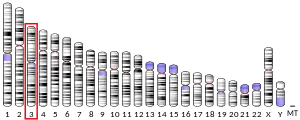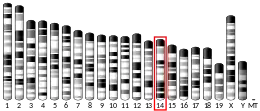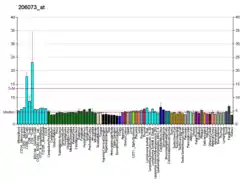COLQ
Acetylcholinesterase collagenic tail peptide also known as AChE Q subunit, acetylcholinesterase-associated collagen, or ColQ is the collagen-tail subunit of acetylcholinesterase found in the neuromuscular junction. In humans it is encoded by the COLQ gene.[5][6]
| COLQ | |||||||||||||||||||||||||||||||||||||||||||||||||||
|---|---|---|---|---|---|---|---|---|---|---|---|---|---|---|---|---|---|---|---|---|---|---|---|---|---|---|---|---|---|---|---|---|---|---|---|---|---|---|---|---|---|---|---|---|---|---|---|---|---|---|---|
| |||||||||||||||||||||||||||||||||||||||||||||||||||
| Identifiers | |||||||||||||||||||||||||||||||||||||||||||||||||||
| Aliases | COLQ, EAD, CMS5, collagen-like tail subunit (single strand of homotrimer) of asymmetric acetylcholinesterase, collagen like tail subunit of asymmetric acetylcholinesterase | ||||||||||||||||||||||||||||||||||||||||||||||||||
| External IDs | OMIM: 603033 MGI: 1338761 HomoloGene: 10437 GeneCards: COLQ | ||||||||||||||||||||||||||||||||||||||||||||||||||
| |||||||||||||||||||||||||||||||||||||||||||||||||||
| |||||||||||||||||||||||||||||||||||||||||||||||||||
| |||||||||||||||||||||||||||||||||||||||||||||||||||
| |||||||||||||||||||||||||||||||||||||||||||||||||||
| |||||||||||||||||||||||||||||||||||||||||||||||||||
| Wikidata | |||||||||||||||||||||||||||||||||||||||||||||||||||
| |||||||||||||||||||||||||||||||||||||||||||||||||||
Function
This gene encodes the subunit of a collagen-like molecule associated with acetylcholinesterase in skeletal muscle. Each molecule is composed of three identical subunits. Each subunit contains a proline-rich attachment domain (PRAD) that binds an acetylcholinesterase tetramer to anchor the catalytic subunit of the enzyme to the basal lamina. Multiple transcript variants encoding different isoforms have been found for this gene.[6]
Clinical significance
Mutations in this gene are associated with endplate acetylcholinesterase deficiency.[6]
References
- GRCh38: Ensembl release 89: ENSG00000206561 - Ensembl, May 2017
- GRCm38: Ensembl release 89: ENSMUSG00000057606 - Ensembl, May 2017
- "Human PubMed Reference:". National Center for Biotechnology Information, U.S. National Library of Medicine.
- "Mouse PubMed Reference:". National Center for Biotechnology Information, U.S. National Library of Medicine.
- Ohno K, Brengman J, Tsujino A, Engel AG (Sep 1998). "Human endplate acetylcholinesterase deficiency caused by mutations in the collagen-like tail subunit (ColQ) of the asymmetric enzyme". Proc Natl Acad Sci U S A. 95 (16): 9654–9. Bibcode:1998PNAS...95.9654O. doi:10.1073/pnas.95.16.9654. PMC 21394. PMID 9689136.
- "Entrez Gene: COLQ collagen-like tail subunit (single strand of homotrimer) of asymmetric acetylcholinesterase".
External links
- Human COLQ genome location and COLQ gene details page in the UCSC Genome Browser.
Further reading
- Donger C, Krejci E, Serradell AP, et al. (1998). "Mutation in the human acetylcholinesterase-associated collagen gene, COLQ, is responsible for congenital myasthenic syndrome with end-plate acetylcholinesterase deficiency (Type Ic)". Am. J. Hum. Genet. 63 (4): 967–75. doi:10.1086/302059. PMC 1377491. PMID 9758617.
- Ohno K, Brengman JM, Felice KJ, et al. (1999). "Congenital end-plate acetylcholinesterase deficiency caused by a nonsense mutation and an A-->G splice-donor-site mutation at position +3 of the collagenlike-tail-subunit gene (COLQ): how does G at position +3 result in aberrant splicing?". Am. J. Hum. Genet. 65 (3): 635–44. doi:10.1086/302551. PMC 1377969. PMID 10441569.
- Altamirano CV, Lockridge O (1999). "Conserved aromatic residues of the C-terminus of human butyrylcholinesterase mediate the association of tetramers". Biochemistry. 38 (40): 13414–22. doi:10.1021/bi991475+. PMID 10529218.
- Ohno K, Engel AG, Brengman JM, et al. (2000). "The spectrum of mutations causing end-plate acetylcholinesterase deficiency". Ann. Neurol. 47 (2): 162–70. doi:10.1002/1531-8249(200002)47:2<162::AID-ANA5>3.0.CO;2-Q. PMID 10665486. S2CID 9178923.
- Deprez P, Inestrosa NC (2000). "Molecular modeling of the collagen-like tail of asymmetric acetylcholinesterase". Protein Eng. 13 (1): 27–34. doi:10.1093/protein/13.1.27. hdl:10533/172149. PMID 10679527.
- Shapira YA, Sadeh ME, Bergtraum MP, et al. (2002). "Three novel COLQ mutations and variation of phenotypic expressivity due to G240X". Neurology. 58 (4): 603–9. doi:10.1212/wnl.58.4.603. PMID 11865139. S2CID 43142424.
- Strausberg RL, Feingold EA, Grouse LH, et al. (2003). "Generation and initial analysis of more than 15,000 full-length human and mouse cDNA sequences". Proc. Natl. Acad. Sci. U.S.A. 99 (26): 16899–903. Bibcode:2002PNAS...9916899M. doi:10.1073/pnas.242603899. PMC 139241. PMID 12477932.
- Ishigaki K, Nicolle D, Krejci E, et al. (2003). "Two novel mutations in the COLQ gene cause endplate acetylcholinesterase deficiency". Neuromuscul. Disord. 13 (3): 236–44. doi:10.1016/s0960-8966(02)00243-2. PMID 12609505. S2CID 19202945.
- Hillman RT, Green RE, Brenner SE (2005). "An unappreciated role for RNA surveillance". Genome Biol. 5 (2): R8. doi:10.1186/gb-2004-5-2-r8. PMC 395752. PMID 14759258.
- Cartaud A, Strochlic L, Guerra M, et al. (2004). "MuSK is required for anchoring acetylcholinesterase at the neuromuscular junction". J. Cell Biol. 165 (4): 505–15. doi:10.1083/jcb.200307164. PMC 2172359. PMID 15159418.
- Gerhard DS, Wagner L, Feingold EA, et al. (2004). "The Status, Quality, and Expansion of the NIH Full-Length cDNA Project: The Mammalian Gene Collection (MGC)". Genome Res. 14 (10B): 2121–7. doi:10.1101/gr.2596504. PMC 528928. PMID 15489334.
- Dvir H, Harel M, Bon S, et al. (2005). "The synaptic acetylcholinesterase tetramer assembles around a polyproline II helix". EMBO J. 23 (22): 4394–405. doi:10.1038/sj.emboj.7600425. PMC 526459. PMID 15526038.
- Ting AK, Siow NL, Kong LW, Tsim KW (2006). "Transcriptional regulation of acetylcholinesterase-associated collagen ColQ in fast- and slow-twitch muscle fibers". Chem. Biol. Interact. 157–158: 63–70. doi:10.1016/j.cbi.2005.10.009. PMID 16256971.
- Schreiner F, Hoppenz M, Klaeren R, et al. (2007). "Novel COLQ mutation 950delC in synaptic congenital myasthenic syndrome and symptomatic heterozygous relatives". Neuromuscul. Disord. 17 (3): 262–5. doi:10.1016/j.nmd.2006.11.010. PMID 17300939. S2CID 30720410.




